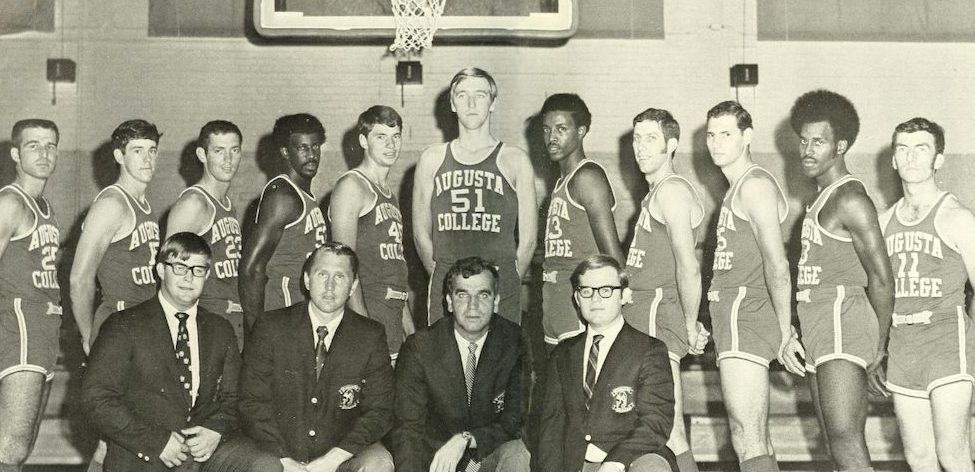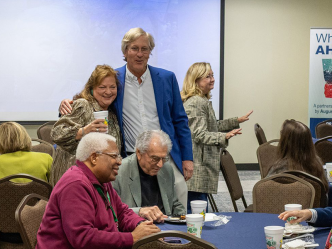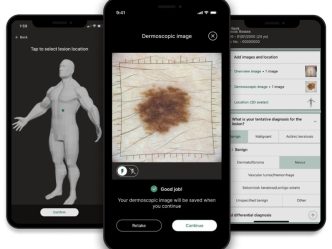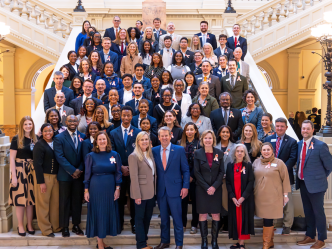When Lenny Carlson, the former assistant basketball coach for Augusta University, first walked into the college’s gym to meet his Jaguar team in 1968, he immediately noticed something was missing.
“I remember I walked into this tiny gymnasium up on the Hill on the first day and I sat down,” Carlson said, adding he had just been hired by then-Jaguar Athletic Director Marvin Vanover, who was also the basketball team’s head coach. “I was watching the players and I see all these white guys out on the court. I turned to Marvin and asked, ‘Where are all the black players?’ He said, ‘We don’t have any.’”
The blunt statement was jarring for Carlson.
After all, Carlson grew up in Worcester, Massachusetts, and graduated from the University of Connecticut in 1962. As UConn’s basketball team captain, Carlson led the Huskies in scoring both his junior and senior years on racially diverse teams. He was an All-Yankee Conference, All-New England and All-America selection who played on integrated teams throughout his basketball career.
As a member of the military, Carlson was also named to two consecutive All-Army basketball teams and eventually spent the next three seasons playing professionally for the European Basketball League franchise in Antwerp, Belgium.
“Playing professionally, I played on teams where I was the only white guy,” Carlson said. “So, to go into a situation at Augusta College where there are no black players, it was unbelievable to me. I remember asking Marvin again, ‘You don’t have any black players?’”
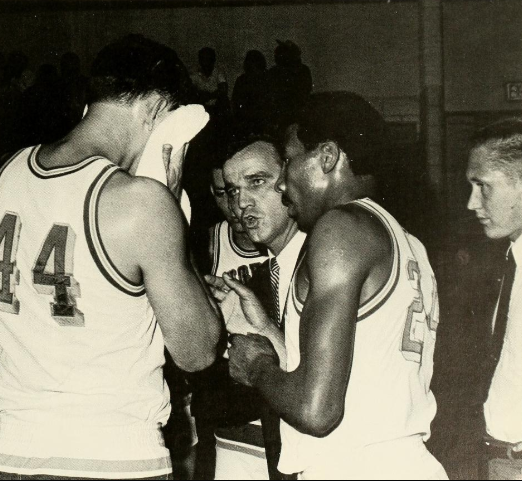
Vanover, a native of Harlan, Kentucky, and graduate of Georgia Southern University, was well aware that most collegiate teams in the South were still segregated.
While he didn’t agree with those beliefs, Vanover knew a great deal of racial tension remained in the South during the 1960s.
As a result, Vanover simply shook his head and once again said, “No.”
“Still in shock, I then asked Marvin, ‘Do you ever win any games?’” said Carlson, who is now a professional basketball talent scout and veteran of more than 40 years of coaching at all levels of basketball. “I remember, Marvin had this passive look on his face and he said, ‘Nobody has any black players down here.’”
Time for change at Augusta College
At that moment, on his first day as an assistant basketball coach at Augusta College, Carlson knew change was coming to Augusta and the entire state of Georgia.
“This light bulb went on,” Carlson said.
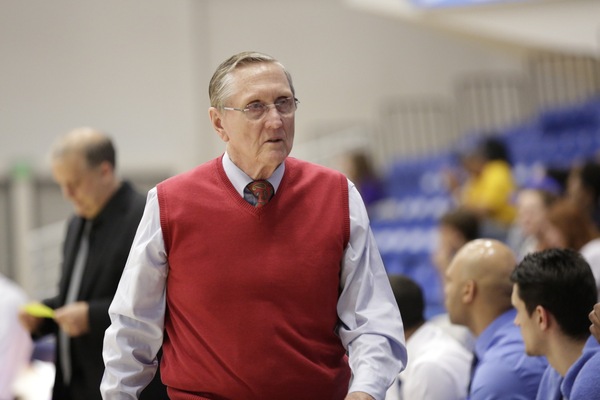
He immediately began talking to Vanover about recruiting black basketball players to come to Augusta College. Vanover fully supported the idea, but he knew he had to get permission from then-Augusta College President Gerald Robins.
“Marvin went to the president and he was given permission. It was a huge turning point for our team,” Carlson said. “Afterwards, I remember Marvin saying to me, ‘You know, if this doesn’t work and we don’t win, I will be able to keep my job. But you’re a Yankee. You’ll be run out of town.’”
While Vanover was joking with him, Carlson knew the significance of what they were doing.
This wasn’t just about a game.
I believe that because of what Marvin Vanover did in 1968, it allowed me to come here in 1988 and become the university’s first black athletic director. This university owes Marvin a great deal of gratitude.”
Clint Bryant
In 1968, Augusta College became the first predominately white college in the entire state of Georgia to have an integrated basketball team.
More than 50 years later, Clint Bryant, Augusta University’s director of athletics since 1988, believes Vanover’s courage opened a lot of doors to more diversity throughout the college.
“What Marvin did during that time was very, very bold,” Bryant said, adding that Augusta University lost a great leader when Vanover passed away in 2017. “This was back in 1968 and, you must understand, Augusta College at that time was called the Harvard on the Hill. It was almost very exclusive. Then, you also had the historically black institution in Paine College. So, I’m sure it wasn’t easy for Marvin. He probably got hate mail and everything else.”
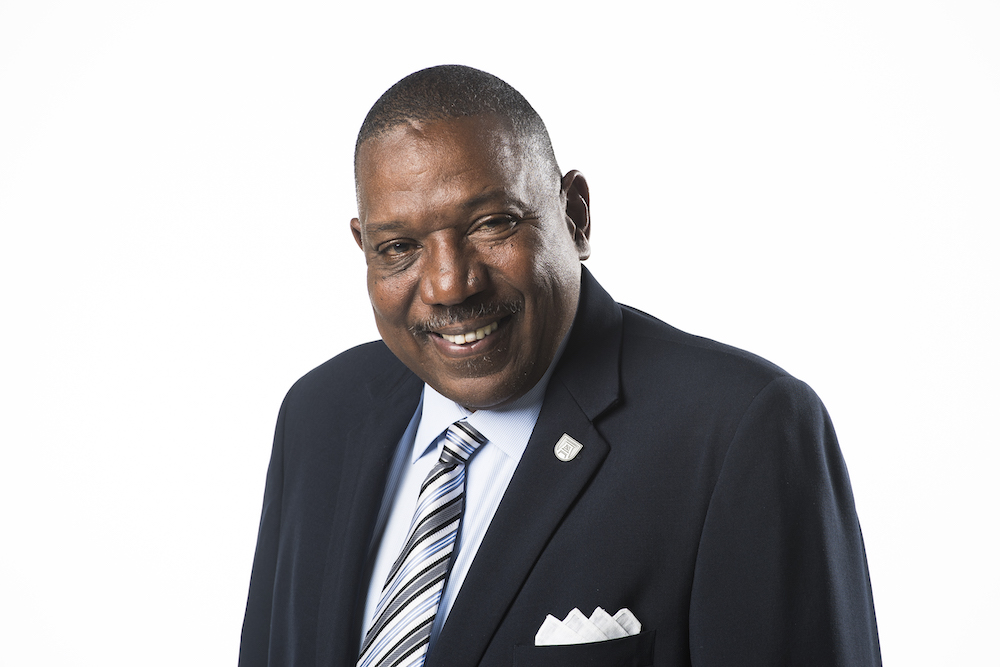
But sometimes it just takes the strength of one man to change the minds of many, Bryant said.
“I always tell people that I liked being the athletic director and basketball coach like Marvin when I came to Augusta University because you find yourself standing on the shoulders of the people before you,” Bryant said. “I believe that because of what Marvin Vanover did in 1968, it allowed me to come here in 1988 and become the university’s first black athletic director. This university owes Marvin a great deal of gratitude.”
Building a dream team
Not only did Vanover receive approval from the president to begin recruiting black players for the basketball team, but he was also given a handful of scholarships to help build the best possible integrated team for Augusta College.
“We went to work right away and Vince Proctor from Detroit, Michigan, became Augusta College’s first black player in 1968. He was from the Army,” Carlson said, adding that prior to coaching at Augusta College, he worked at the Army’s former Oliver General complex that was primarily used by officers and soldiers stationed at Fort Gordon.
“We really recruited heavily from the Army in those early years. Because of the draft, there were many great players in the service and Vince Proctor was one of those players. Unfortunately, he only stayed one year at Augusta College.”
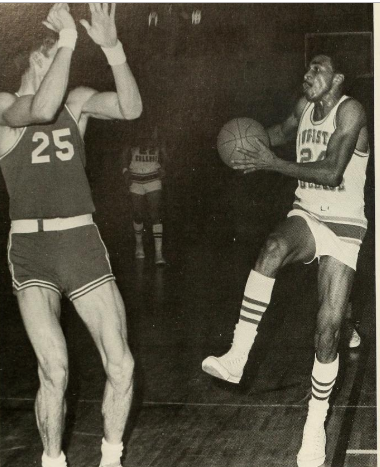
By 1969, Augusta College had recruited “Jumping Joe” McBride, an All-American basketball player from Birmingham, Alabama, who was also out of the Army.
McBride was known for his tremendous energy and excitement on the court, Carlson said.
But, ironically, it wasn’t until Carlson fell ill with the flu on a bus headed to a game in 1969 Asheville, North Carolina, that he was truly able to round out the team.
“I was so sick on that trip,” Carlson said, chuckling. “I remember when we finally got up to the game in Asheville, Marvin said, ‘I’m going to go to the pre-game meal.’ I told him, ‘I can’t go. Just get me a pillow and some blankets and I’ll lay on the bleachers.’”
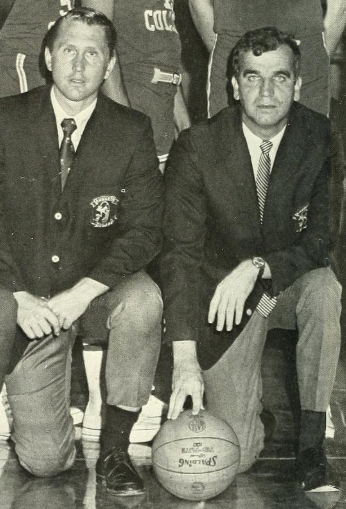
In a feverish haze as he was resting his head on the bleachers, Carlson said he began seeing a player’s hands constantly going over the rim and dunking the ball.
“I’m half in and half out of it while I’m watching this junior varsity game with UNC-Asheville playing Isothermal Community College from North Carolina,” Carlson said. “I just kept seeing these two black hands going over the rim and over the rim and over the rim. And I thought, ‘I must be hallucinating.’”
Finally, Carlson sat up and began watching the game.
“I watched this extremely talented black player race up and down the court. Immediately after the game, I walked right into the locker room and asked him, ‘What’s your name?’ And he said, ‘Erwin Johnson,’” Carlson said. “I said, ‘What’s your nickname?’ And he said, ‘Chip.’”
As a native of Charleston, South Carolina, Erwin “Chip” Johnson was a local basketball legend in his hometown. He got the nickname “Chip” because he looked so much like his father that people used to say that he was a “chip off the old block.”
Initially, Johnson had signed with South Carolina State after his senior year at Burke High School in Charleston, but he later transferred to Isothermal Community College in North Carolina.
“Growing up in Charleston, I always played sports in my yard,” Johnson said. “In fact, we nailed a peach basket up against the house that we used to play basketball. When I got older, I started playing on the playgrounds and eventually in the summer basketball league for the city’s recreation department.”
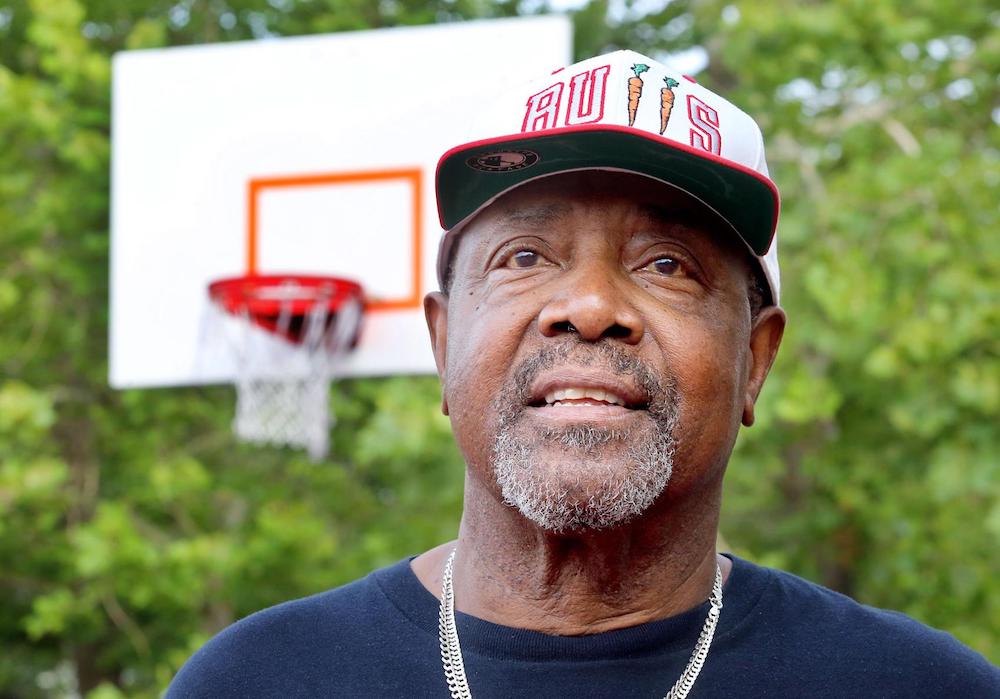
By his senior year in high school, Johnson said he received 25 letters from various schools across the country, including the University of Tennessee, South Carolina State University, East Tennessee State University and Oral Roberts University, asking him to play on their basketball teams.
“I chose South Carolina State College at first, but that did not work out,” Johnson said. “I tried to get into other schools, but, since I hadn’t completed a full semester, I had to sit out a year.” That’s what led Johnson to play for Isothermal Community College, but Carlson immediately knew Johnson had so much more potential than this small community college in North Carolina.
“I said, ‘Chip, what are you going to do next year?’” Carlson said. “And he said, ‘Well, I want to get a scholarship to go to college.’”
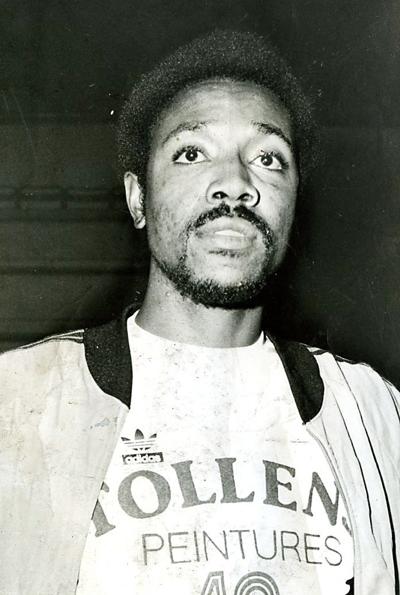
With that, Carlson sprang into action.
When he began as assistant coach at Augusta College, he made a habit of carrying a scholarship agreement signed by Vanover in his jacket pocket.
“I pulled out the signed paper offering a scholarship and told Chip, ‘Sign it,’” Carlson said. “Finally, after our team played its game and won, we were going back on the bus to Augusta. I remember I was finally starting to feel better and Marvin leaned over and asked me, ‘Who do you think was the best player in the gymnasium tonight?’ I replied, ‘The guy you signed.’”
He presented Vanover with the copy of Johnson’s signed scholarship to attend Augusta College.
“Marvin was like, ‘What?’” Carlson said, laughing. “I said, ‘His name is Erwin Johnson. He played in the freshman game and he’s incredible.’ And so it began.”
The road to a winning season
As Johnson toured Augusta College for the first time in 1969, he didn’t know exactly what to think.
“The first time I had ever heard of Augusta College was when Coach Carlson offered me that scholarship in Asheville,” Johnson said, chuckling. “And I chose Augusta College because I was able to come to summer school there in 1969 and make up some hours so I would be eligible to play in October.”
But coming from Charleston, Johnson knew nothing about his new school and was surprised by its appearance.
“When I first got there, it looked like a military training facility to me,” Johnson said. “But I walked around the school and checked out the classes. I also met Coach Vanover and found out that he was a real nice person. And Coach Carlson was straight up with me, which I really appreciated.”
Johnson also found out that two newspapers in the area and several radio stations covered the games at Augusta College.
“I knew in order to get into the next level for a professional player, you had to get publicity,” Johnson said. “Augusta College had a lot of publicity from the local press. It also had a pretty good basketball program, a pretty darn good school and I got a chance to play right away, so that’s why I chose Augusta College.”
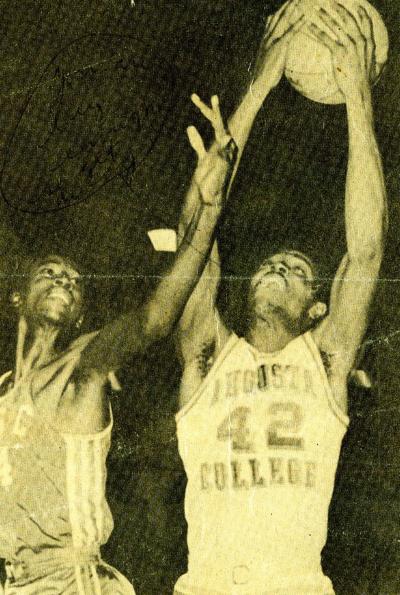
After learning that Augusta College would have the first integrated basketball team in Georgia, Johnson said he wasn’t concerned at all.
“I didn’t really think about it that much,” Johnson said. “I was pleased and satisfied that I was in school and I had a chance to further my education and I had a chance to play basketball at another level. I was pretty much content. Actually, I didn’t have any race conflicts the whole time I was there.”
One of contributing factors to the team’s success was that each of the players got along with one another, Johnson said.
In fact, Johnson recalled a great deal of camaraderie between not only the black and white American players, but also Augusta College’s first international basketball player.
“George Schraepen was a 7-foot-1 center from Belgium,” Johnson said. “He had good potential. I think if he could have stayed here in America, Coach Vanover and Coach Carlson would have developed him into a draft choice in the NBA.”
In front of packed crowds of both white and black fans, Augusta College’s 1969-70 basketball team dominated, winning 22 of its first 23 games.
Unfortunately, midway during the season, the team lost Schraepen because he had to return to Belgium.
Regardless of the setback, the Jaguars finished the regular season 24-4 and advanced to the District 25 championships. Five starters averaged in double figures, led by McBride with 22.7 points per game and Johnson with 22.2 points per game.
In the opening round of the district playoffs, the Jaguars defeated Albany State 95-78 and won the championship with a 60-54 win over Valdosta State.
Augusta College made it to the NAIA’s national tournament in Kansas City, Missouri, but the team lost to No. 1 ranked Stephen F. Austin University from Texas in the semi-finals with a score of 74-71.
“We lost in the semi-finals of the national championship because George (Schraepen) had to go home. If he had not gone home, we would have been the national champions,” Carlson said without any hesitation. “But during the semi-finals, Joe McBride and Chip Johnson got into foul trouble near the end of the game and we narrowly lost by three points.”
The 1969-70 team’s legacy
Despite the loss in the semi-finals, the success of the Jaguars’ basketball team helped put Augusta College on the map.
The 1969-70 team was ranked No. 5 in the nation and Vanover was named Georgia Collegiate Coach of the Year.
“We worked hard throughout the season and it paid off,” Johnson said. “We were a small school but we had a nice powerhouse at the time.”
In the two seasons that Johnson played for Augusta College, he scored 1,358 points, ranking him No. 14 in all-time scoring at the university. Johnson is also ranked fourth all time in rebounds at Augusta College.
“I play to win and I play hard,” Johnson said. “That’s what the pros were looking for and the newspapers covered us well. We were also a crowd pleaser. We put on a real good show because we did some spectacular dunking, we blocked shots and we stole the ball. The fans were really behind us and they came out to support us.”
To this day, Carlson said he can still see the enormous crowds that packed the university’s gymnasium, desperate to find a seat.
“You couldn’t put another person in the gym,” Carlson said, admitting that there were many nights when the gym exceeded the maximum capacity set by the fire marshal. “You could even see people up in the rafters in the gym. We would just load the place up.”
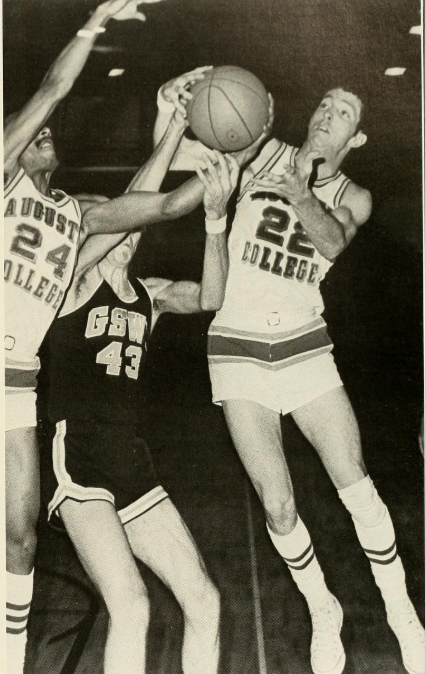
By 1971, McBride and Johnson, who combined to average more than 44 points and 29 rebounds a game, were eventually drafted by NBA teams Cincinnati and Philadelphia, respectively.
“Joe McBride was drafted by the Cincinnati Royals and Chip Johnson was drafted by the Philadelphia 76ers,” Carlson said. “We also had a white player from the Army by the name of Steve Brown. He went to the Atlanta Hawks. So, at little Augusta College, we had three players invited to camps in the NBA. It has never happened since and probably will never happen again.”
While Johnson and McBride failed to make the NBA teams, they each went on to play professionally for several seasons in Europe.
“I played in Paris for three years and then I played in Brussels, Belgium, for two years,” Johnson said. “We traveled all over Europe. It was absolutely beautiful and an incredible experience.”
While Carlson is proud of the 1969-70 team’s accomplishments on the court, he also deeply respects the manner in which the team and the entire campus embraced one another that season.
“There were no incidents on our campus,” Carlson said. “Of course, there were the riots in downtown Augusta in 1970, but we never had a problem on Augusta College’s campus. But, going on the road to another college for a game, holy moly, that was another story.”
The simplest tasks needed to be thoroughly planned and discussed in order to keep the entire team safe.
“We had to find places where we could sleep and places where we could eat,” Carlson said, adding one college almost canceled its game against Augusta College when they saw there were minority players on the team. “When the coach said he wasn’t going to play our team, I said, ‘OK, then you forfeit. And if you forfeit, you have a chance of being kicked out of the conference.’ Before you knew it, they were playing us on the court.”
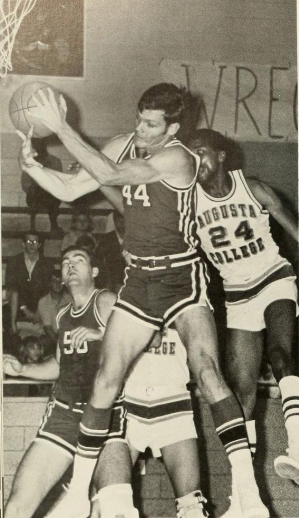
Carlson and Vanover also intentionally encouraged the entire team to socialize with one another as much as possible.
“We always roomed a black player with a white player. It was important,” Carlson said. “Years later, when the players came back and talked to us, they said, ‘The most interesting part was how little black people knew about white people and how little white people knew about black people.’ But, all of sudden, if you’re sleeping in the same room, you’re talking to one another and getting to know each other.”
That bond kept the entire team united and strong, Carlson said.
“We taught them the best way to win was to get the best players and those kids were the best players. We knew it and they knew it,” Carlson said. “So, when we went on the road, if there was anything said to any of our players, you would have to fight every one of those guys. We were a team. We stood together as one.”
 Augusta University
Augusta University
